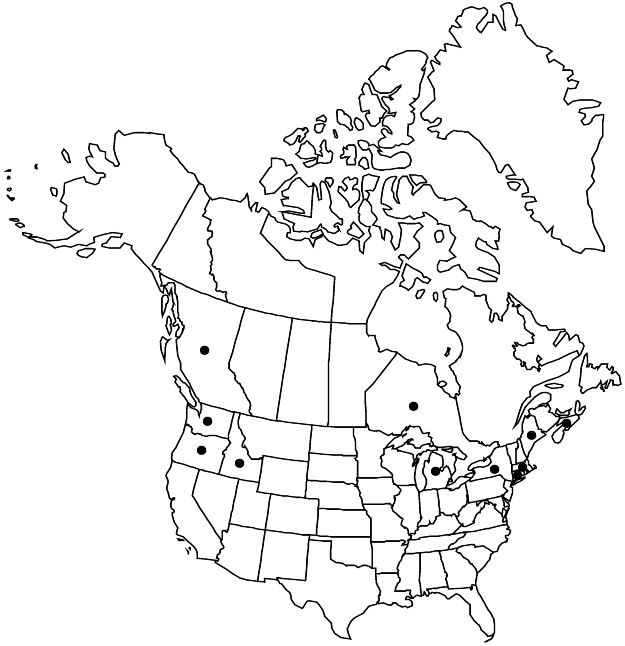Difference between revisions of "Prunus spinosa"
Sp. Pl. 1: 475. 1753.
FNA>Volume Importer |
imported>Volume Importer |
||
| (2 intermediate revisions by 2 users not shown) | |||
| Line 28: | Line 28: | ||
|elevation=0–1000 m | |elevation=0–1000 m | ||
|distribution=B.C.;N.S.;Ont.;Conn.;Idaho;Maine;Mass.;Mich.;N.Y.;Oreg.;Wash.;Eurasia;n Africa. | |distribution=B.C.;N.S.;Ont.;Conn.;Idaho;Maine;Mass.;Mich.;N.Y.;Oreg.;Wash.;Eurasia;n Africa. | ||
| + | |introduced=true | ||
|discussion=<p>As past flora writers (C. L. Hitchcock et al. 1955–1969; E. G. Voss 1972–1996) have noted, the distinctions between <i>Prunus spinosa</i> and <i>P. domestica</i> are not clear. Some researchers consider the hexaploid <i>P. domestica</i> to have been derived from the tetraploid <i>P. spinosa</i>, often in a scenario involving hybridization with <i>P. cerasifera</i>. It should not be surprising that some of the characters used in keys to separate these three taxa (spininess, indument, leaf size, pedicel length, numbers of flowers per bud) are subject to variation within each species and overlap among the species.</p> | |discussion=<p>As past flora writers (C. L. Hitchcock et al. 1955–1969; E. G. Voss 1972–1996) have noted, the distinctions between <i>Prunus spinosa</i> and <i>P. domestica</i> are not clear. Some researchers consider the hexaploid <i>P. domestica</i> to have been derived from the tetraploid <i>P. spinosa</i>, often in a scenario involving hybridization with <i>P. cerasifera</i>. It should not be surprising that some of the characters used in keys to separate these three taxa (spininess, indument, leaf size, pedicel length, numbers of flowers per bud) are subject to variation within each species and overlap among the species.</p> | ||
|tables= | |tables= | ||
| Line 52: | Line 53: | ||
|publication year=1753 | |publication year=1753 | ||
|special status=Introduced | |special status=Introduced | ||
| − | |source xml=https:// | + | |source xml=https://bitbucket.org/aafc-mbb/fna-data-curation/src/2e0870ddd59836b60bcf96646a41e87ea5a5943a/coarse_grained_fna_xml/V9/V9_623.xml |
|subfamily=Rosaceae subfam. Amygdaloideae | |subfamily=Rosaceae subfam. Amygdaloideae | ||
|tribe=Rosaceae tribe Amygdaleae | |tribe=Rosaceae tribe Amygdaleae | ||
Latest revision as of 22:58, 5 November 2020
Shrubs, suckering, 10–40 dm, thorny. Twigs with axillary end buds, hairy. Leaves deciduous; petiole 4–7 mm, hairy, eglandular; blade elliptic to obovate, 1.5–4 × 1–2.2 cm, base obtuse to rounded, margins crenulate-serrulate, teeth blunt, often glandular, apex acute to obtuse, abaxial surface hairy (especially along midribs and veins), adaxial glabrate. Inflorescences usually solitary flowers, sometimes 2-flowered fascicles. Pedicels 0.5–5(–8) mm, usually glabrous, rarely hairy. Flowers blooming before leaf emergence; hypanthium cupulate, 1.5–2.5 mm, glabrous externally; sepals spreading, oblong, 1.5–2.5 mm, margins glandular-toothed, surfaces glabrous or adaxially hairy at bases; petals white, elliptic, 4–8 mm; ovaries glabrous. Drupes bluish black, globose, 10–15 mm, glabrous; mesocarps fleshy; stones subglobose, ± flattened. 2n = 32.
Phenology: Flowering Mar–May; fruiting Aug–Sep.
Habitat: Roadsides
Elevation: 0–1000 m
Distribution

Introduced; B.C., N.S., Ont., Conn., Idaho, Maine, Mass., Mich., N.Y., Oreg., Wash., Eurasia, n Africa.
Discussion
As past flora writers (C. L. Hitchcock et al. 1955–1969; E. G. Voss 1972–1996) have noted, the distinctions between Prunus spinosa and P. domestica are not clear. Some researchers consider the hexaploid P. domestica to have been derived from the tetraploid P. spinosa, often in a scenario involving hybridization with P. cerasifera. It should not be surprising that some of the characters used in keys to separate these three taxa (spininess, indument, leaf size, pedicel length, numbers of flowers per bud) are subject to variation within each species and overlap among the species.
Selected References
None.